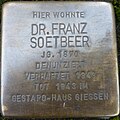Franz Soetbeer
Franz Soetbeer (born January 6, 1870 in Altona , Schleswig-Holstein province , † March 27, 1943 in Gießen ) was a German internist and university professor.
Life
Soetbeer attended the Christianeum high school and took a supplementary examination at the Clausthal high school . He then studied medicine from 1890 at the University of Jena . In 1891 he became active in the Corps Franconia Jena . As an inactive , he moved to the Christian Albrechts University in Kiel for the winter semester of 1892/93 , where he took the physics course . He returned to Jena in 1893, where he passed the state examination. With a physiological doctoral thesis he was awarded Dr. med. PhD .
Career
He moved to the Ruprecht-Karls-Universität Heidelberg and worked in pharmacology and pediatrics . In 1902 he completed his habilitation in internal medicine . From October 1903 to April 1905 he was initially a volunteer, then a senior physician and private lecturer at the Medical Clinic of the Royal University of Greifswald .
From April 1, 1905, he held a position as an assistant doctor at the Medical Clinic of the University Hospital Giessen . Without further examination requirements, the Hessian Ludwigs University awarded him the Venia legendi for internal medicine on July 22, 1905 . On February 22, 1908, he received an extraordinary extraordinary position . He headed the Balneological-Medical Institute of the University of Gießen in Bad Nauheim .
Persecution and expropriation
While in Giessen Jewish students never made up more than 2% of the student body, in 1933 every fifth professor had Jewish roots. Among them were Margarete Bieber , Fritz Moritz Heichelheim , George Jaffé , Ludwig Schlesinger , Richard Laqueur , Leo Rosenberg and Paul Mombert . The three Jewish medicine professors were Julius Geppert , Alfred Storch and Franz Soetbeer. Although Soetbeer was a Protestant denomination, his license to teach was withdrawn on July 20, 1933, in accordance with § 6 and § 7 of the Law for the Restoration of the Professional Civil Service and denied access to the clinic; because as the son of a (also baptized) Jew, he was considered a half-Jew. His doctor's office was boycotted . In the spring of 1938, he had to sell his house at Frankfurter Strasse 49 to the Hessian Building Department, far below its value. It was made available to the administration of the university clinics. Soetbeer moved to Alicenstrasse. Ten years later, in the middle of World War II, he was arrested by the Secret State Police on March 26, 1943 and taken to the basement of their house in the Neue Bäue. Out of desperation, he committed suicide on March 27, 1943.
A stumbling block was laid in front of Soetbeer's house in Alicenstrasse in September 2010 .
literature
- Erwin Knauß : The Jewish population of Giessen, 1933–1945 . Self-published by the Commission for the History of the Jews in Hesse Wiesbaden 4th edition 1987. ISBN 978-3-921434-08-6 . GoogleBooks
- Volker Roelcke , Sigrid Oehler-Klein, Ulrike Enke: The Medical Faculty of the University of Giessen during National Socialism and in the post-war period: people and institutions, upheavals and continuities . David Brown Book Company, 2007. ISBN 978-3515090438 . GoogleBooks
Web links
Individual evidence
- ↑ Kösener Corpslisten 1930, 74/459; 1960, 26/458.
- ↑ a b c d Personal documents in the JLU university archive, signature PrA Med No. 12
- ↑ Dissertation: About the body heat of the pikilothermal vertebrates .
- ^ Habilitation thesis: The secretion work of the sick kidney .
- ↑ History of the University Children's Hospital Erlangen (2005)
- ↑ Almost 100 stumbling blocks for Gießen Nazi victims (Gießener-Allgemeine.de)
- ↑ a b Jonathan C. Friedman : The Lion and the Star (1998)
- ↑ Susanne Meinl, Jutta Zwilling: The plundering of the Jews under National Socialism by the Reich Finance Administration in Hesse (2004)
- ↑ Letter from Soetbeer's daughter Gertrud Seitz, b. Soetbeer from March 26, 1946
| personal data | |
|---|---|
| SURNAME | Soetbeer, Franz |
| BRIEF DESCRIPTION | German internist and university professor |
| DATE OF BIRTH | January 6, 1870 |
| PLACE OF BIRTH | Altona , Schleswig-Holstein Province |
| DATE OF DEATH | March 27, 1943 |
| Place of death | to water |



